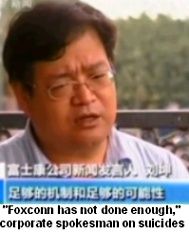By Numerian
 Chances are if you are a typical American consumer you have purchased something made by Foxconn Technology Group. This giant Taiwanese-owned company is under contract to make Sony’s Playstation, the Xbox 360, the Wii, motherboards for Intel, routers for Cisco, and Apple’s iPhone, iPod, and iPad. As profitable as Foxconn is, it is in a fundamental sense a failure of capitalism. At a time when machine tools and robotics are available to make these products at high speeds, Foxconn uses manual labor to craft tens of thousands of electronic devices each hour, 24 hours a day. (Image)
Chances are if you are a typical American consumer you have purchased something made by Foxconn Technology Group. This giant Taiwanese-owned company is under contract to make Sony’s Playstation, the Xbox 360, the Wii, motherboards for Intel, routers for Cisco, and Apple’s iPhone, iPod, and iPad. As profitable as Foxconn is, it is in a fundamental sense a failure of capitalism. At a time when machine tools and robotics are available to make these products at high speeds, Foxconn uses manual labor to craft tens of thousands of electronic devices each hour, 24 hours a day. (Image)
To accomplish this, Foxconn employs over 800,000 workers in mainland China alone, and 420,000 of them at a massive “campus” in Shenzen. The workers in Shenzen are required to live on campus in dormitories with bunk beds, cafeterias, a medical unit, and a few recreational facilities. The overwhelming number of them range in age from 18 to 24, have moved to Shenzen from rural villages with no job opportunities, work six days a week at the factory for 10 hours a day including overtime, and make about $130 a month.
According to reporters who have worked undercover at Foxconn, the jobs are mind-numbingly boring and repetitive. Taiwanese managers hover over the assembly lines, urging the workers to regularly increase output and productivity. Absolutely no talking is allowed among workers during work shifts, and the factory is run with military precision, including strict rules governing breaks and discipline administered freely. Many employees choose to give up their Sundays in order to earn more overtime, and Apple found in a study of the plant that 25% of the time workers had no day off during the week.
Spotlessly Clean
The factories are spotlessly clean, given the nature of the electronics manufacturing underway, the food is said to be good, and the dorms are modern. Many employees say the employment and pay are much better than anything they could achieve on a farm, with their limited educations. They also say there is very little time for themselves, and the demands of the assembly line are such that they quickly lose their “soul”. Those who have been there a few years claim they still do not know the names of their bunk mates.

These conditions have prompted a spate of worker suicides on campus in the past two years, with 10 deaths being recorded so far in 2010. The suicide rate is not necessarily aberrant, given the fact that the Shenzen plant alone is equivalent to a mini-city in China, and is larger in population that Cincinnati, Ohio. So many suicides in such a cluster is unusual, especially among young people. The most famous suicide was Sun Danyong, a worker responsible for processing 16 prototype iPhones when one went missing.
Foxconn promises its clients protection of its manufacturing secrets. Security around the campus is intense, and employees are made aware from day one which parts of the complex are off-limits. The loss of the iPhone reached the ears of Steven Jobs himself, a man notorious for his demands for secrecy at Apple, and Mr. Sun was quickly interrogated by Foxconn security personnel. Local newspapers reported he was beaten and his apartment illegally searched, shortly after which he jumped to his death from the top of the building.
Acting with Impunity
The fact that local and national newspapers have criticized Foxconn publicly is unusual in China, especially for the local press, since even the police admit that Foxconn is able to act with impunity on its campus. It is possible the criticism is allowed by party officials since Foxconn is Taiwanese-owned. Foxconn has been forced into a series of responses, starting first by requiring all employees to sign a legal exoneration of the company should they themselves commit suicide. This was a public relations disaster and was quickly abandoned. Mental health counselors were brought in, and recreational facilities expanded. Finally, this week the company announced that entry-level employees were going to have their salary doubled.
This is a rather extraordinary action by the company, suggesting that their profit margins are considerable at the plant, given that Foxconn is not asking Intel or Apple or any of its clients to absorb these higher costs. The one thing Foxconn has not said it would do is revisit its assembly line practices, which would be tantamount to calling into question its entire way of doing business. Nor would Chinese authorities want it to do so. Foxconn employs the very same rootless youth whom the Communist Party worries about most. Party officials estimate there are at any time at least 100 million young people roaming the country looking for work, and many times that number are employed in Chinese export factories, most of which offer much worse environments than Foxconn does.
Even under the new pay scales at Foxconn, which allow for a boost to $295 a month for workers passing a three month review, the typical Foxconn employee cannot afford the iPads and Dell computers the factory produces. Nor can they afford a decent apartment of their own when they leave the company, or a coveted car, the symbol of China’s aspiring middle class. This too is of concern to Party officials, because the promise of a middle class life is being dangled constantly in front of the eyes of such workers, at the same time inflation – especially in property – makes that promise unachievable.
Coming to a WalMart Near You
Meanwhile, at what we might call Foxconn West, workers at Wal-Mart continue to struggle to maintain their middle class life style on an average wage that clocked in this quarter at $11.24 an hour. Like Foxconn, Wal-Mart is run with military precision, except in terms of employees that precision is oriented to preventing workers from running up overtime, rather than pressuring them to do so. Multiple law suits have been filed against Wal-Mart alleging they extract overtime hours from employees routinely without paying them overtime wages, and in a number of documented cases workers were locked in stores overnight in order to complete inventory counts without earning extra pay for the work.
It is a well-known practice at Wal-Mart to avoid paying medical benefits to employees, and to this day less than half of Wal-Mart employees are eligible for health insurance. The rest are dumped on the local hospitals at public cost. Keeping employee costs down is rule number one for Wal-Mart store managers, and for the company’s executives in Arkansas, keeping product cost downs is their rule number one. To this end, Wal-Mart just imposed drastic price cuts on many products in order to lure back to its stores the downtrodden middle class workers who now can barely afford to shop at a discount chain.
This is why Wal-Mart, like Apple and Microsoft and Dell, is never going to seriously question the management practices at places like Foxconn. Wal-Mart’s very survival depends on the ability of companies like Foxconn to exploit workers earning $130 a month working nearly seven days a week.. Apple’s slick, chic retail stores would be empty without iPads costing $499. It is irrelevant how many Foxconn workers jump to their deaths in despair; the most anybody said about the situation came from Steve Jobs, who called the trend “troubling.”
The Symbiotic Chain
In this complex, symbiotic chain, you have Chinese workers promised a middle class lifestyle if only they put in their time at a place most of them describe as a “prison.” The promise is illusory, which is becoming more and more apparent to the lowest of these workers. You also have American middle class workers promised the ability to maintain their lifestyle with everyday low prices at Wal-Mart, except this promise too is illusory since corporations all across America keep pressuring employees with salary freezes, benefit cuts, and ultimately the risk of unemployment, which has now reached 17% of the workforce if you count all disillusioned job seekers. Americans are now catching on to how this game works as well.

In the middle of the chain are the Foxconns and Wal-Marts which drive the process and benefit enormously from the deflationary forces they have unleashed. This is an economic process which has taken on inexorability, now beyond even the control of a company like Wal-Mart, which finds itself forced to squeeze out costs at every step of the chain in order to maintain their profit margins. It appears this process will only end when average Chinese and American wages meet at some unhappy middle ground, like $5,000 a year.
Race to the Bottom
This may take ten or twenty years to accomplish, but the US is well on the way to achieving this goal. About 39 million Americans are classified as poor, meaning their individual earnings are less than $10,830 a year. This includes many Americans who have decent jobs as janitors, medical care-givers, substitute teachers, beauticians, and so on. Most of these workers are too poor to pay any income tax, though they make up for that by paying hefty unemployment and social security taxes. With the recent and growing attacks by economists and politicians on union workers and unfunded pension promises, it is almost certain that a large number of union employees are going to be much poorer in retirement than they expected.
The professional class of lawyers, accountants, doctors, engineers, and entrepreneurs has only begun to be pressured economically by stagnant wages and disappearing bonuses, but now that the process has begun it cannot be reversed. Professionals are going to have to lower their economic expectations substantially, and this includes the most egregious group of all – the investment bankers, hedge fund managers, and equity buyout specialists, all of whom thrived on cheap credit that no longer exists.
The destruction of the credit machine that made it easy for Foxconn to sell to Wal-Mart, who in turn sold cheap goods to the American consumer, means that we can now view unhidden the deflationary impulses that are the true drivers of global trade. Americans can no longer buy on credit, and neither can Greeks or other Europeans who used debt to prop up their middle class lifestyle. They can only buy what they can afford out of dwindling supplies of cash, and this means the companies at the center of the process are forced now to cut well into the bone.
Foxconn, having doubled wages for its workers, will see its profit margins cut and its stock price collapse (it fell 6.8% yesterday), so at some point it will have to take something away from its workers to compensate. That will probably be overtime. Wal-Mart will put on a good show of hiring more workers and helping with their college educations, but in reality overall compensation costs at the company will continue to be pressured lower. Don’t be surprised if the hiring plans are quietly shelved as the economy lingers in depression, and total employment levels at Wal-Mart go down as the remaining workers are asked to do more.
Nor should you be surprised that many Americans who still have a job and some disposable income will buy unnecessary toys like the iPad, unaware of the conditions under which it is made, and oblivious to the irony that every iPad purchase makes it that much harder in the long run for Americans to afford such gadgets in the future.
Reprinted with the permission of the author, Numerian

Comments
Professionals and their income - already arbitraged, affected
STEM occupations, that's Science, Technology, Engineering and Mathematics have had significant wage losses in comparison to their education and skill sets, especially those classified as I.T., which is everything from computer support, to systems administration and network engineers.
Corporations not only have offshore outsourced their jobs in droves, this is where manipulation of U.S. immigration for labor arbitrage has had a dramatic impact. Corporations use H-1B and L-1 (intra company transfer Visas) to displace and labor arbitrage U.S. workers. They are paid on average about 20% less and even worse, there is institutionalized age discrimination in these fields. (and sex discrimination is off the charts, 50% of all women drop out by 10 years). The age discrimination is so bad, it pretty much starts at age 35. There is a Google age discrimination case going up to the California State Supreme court. Win or lose, and if you read this case you know what happened, seen it many times, and hardly any of these cases even are taken up by the EEOC. The EEOC will not even prosecute discriminatory job ads, at all! You see ads saying "H-1B only need apply" (i.e. no American need apply for a job in America), and others which talk about "we surf on the beach every Friday" or "we play online video games every Friday night" and other subtle clues that they only want young, single, males to apply.
We've even seen law firms give talks on how to avoid hiring a U.S. worker and beyond a lot of public outcry....nothing actually happens. We've seen a tick up in some action on fraud, but the general system to displace U.S. workers, nothing happens.
Wages are repressed in STEM for the most part, with the total number of jobs in that occupation going down. Even worse, the BLS counts foreign guest workers in their employment statistics, which masks how bad of a problem this is.
So, while the poor are screwed and to make it even more dramatic, the U.S. poverty rates are so low, there is no way one can even make rent for a studio apartment in most areas of the country with those figures, so are professionals. In fact professionals are an even bigger target for labor arbitrage because labor is a larger percentage of the costs in some of these areas and it's a higher reduction percentage.
Even teachers are being subject to these abuses. They are bringing in foreign teachers on guest worker Visas while the unemployment rate is over 10%.
investors advised to pull out of China
I have a companion to this piece, on the Instapopulist.
I find these actions to be so telling and showing just how much investors and wall street are focused on labor arbitrage, even to invest capital.
When the news broke China was finally raising wages, BoA told all investors to sell and get out of China...
That's just incredible because due to currency manipulation, there is already a built in trade advantage, the Yuan under evaluation estimates are up to 40%.
Instapopulist
Couldn't find your Instapopulist post. Could you share the link That's sounds fascinating. How telling. What a commentary. A nation is on the watch list when it raises wages.
Who do these morons think will buy their products. Henry Ford wanted his workers to afford his cars. It's so fundamental a concept, it shouldn't even be necessary to utter. Yet the 'let the market take care of it' crowd wants to run away from social justice and simple decency whenever it shows up. This is the same Bank of America that is indicted in New York for fraud in their merger activity. They have no shame. They couldn't afford it if they did because they'd simply have to shut down shop.
Michael Collins
don't you see the link in the comment?
The link is right there in the comment plus look to the left hand column, top, that's where the new Instapopulists are. These are shorter pieces that get put into a forum format for indexing, vs. blog posts which are longer, more complex (although frankly the site organization needs work, kind of like my house. ;)
But you cannot see the links, the lighter color? Let me know this because I did site upgrades and if people cannot see the links, that's really not good!
American Slaves Overseas
Toiling away everyday in conditions apparently so bad that suicide is preferable to work, so Americans and Europeans can have Iphones and Ipods and netbooks and cheap electronics etc.,
These companies are already moving to Vietnam, Indonesia and any other lower cost areas so we can continue to have our toys.
But we are surfs to big business here right? I suppose in a micro sense but not otherwise.
Have I-Apple product sales slowed down since? No. Is this a hot topic in the tech blogs or Apple fanboy blogs? No.
BTW there is no way a WalMart employee is living a middle class lifestyle with housing prices inflated through government support of the banks and mortgage subsidies such as interest deductions. Those subsidies keep housing out of reach of that middle class which is much closer to poor.